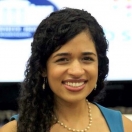
Research shows that during the first years of life, a poor child hears roughly 30 million fewer total words than her more affluent peers. Critically, what she hears has direct consequences for what she learns. Children who experience this drought in heard words have vocabularies that are half the size of their peers by age 3, putting them at a disadvantage before they even step foot in a classroom.
This is what we call the “word gap,” and it can lead to disparities not just in vocabulary size, but also in school readiness, long-term educational and health outcomes, earnings, and family stability even decades later.
It’s important to note that talking to one’s baby doesn’t just promote language development. It promotes brain development more broadly. Every time a parent or caregiver has a positive, engaging verbal interaction with a baby – whether it’s talking, singing, or reading – neural connections of all kinds are strengthened within the baby’s rapidly growing brain.
That’s why today we are releasing a new video message from President Obama focused on the importance of supporting learning in our youngest children to help bridge the word gap and improve their chances for later success in school and in life. The President’s message builds on the key components of his Early Learning Initiative, which proposes a comprehensive plan to provide high-quality early education to children from birth to school entry.
The President’s message is part of a week-long campaign organized in partnership with Too Small to Fail, a joint initiative of the Bill, Hillary & Chelsea Clinton Foundation and Next Generation, to raise awareness of the importance of closing the word gap. The video series follows the first-ever White House Summit on Working Families that explored innovative solutions to help expand opportunities for working families and businesses. The Summit explored a wide range of issues, including expanding access to affordable child care and early education opportunities for families.
Our children’s future is so important, bipartisan leaders are all doing their part to help close the word gap. Watch messages from former Secretary of State Hillary Clinton, former Senate Majority Leader Bill Frist, and Cindy McCain, and share these messages with your networks to help spread the word about this cause.
This fall, the White House Office of Science and Technology Policy and the Department of Health and Human Services will team up with Too Small to Fail and the Urban Institute to host an event designed to increase public understanding and make progress on this important issue. This event will highlight initiatives across the country focused on bridging the word gap, including:
- Too Small to Fail’s Talking is Teaching public action campaign aimed at educating parents about the importance of talking to one’s baby and testing out community-level approaches, including in Tulsa, Oklahoma, where Too Small to Fail is working in partnership with the George Kaiser Family Foundation. This campaign will engage pediatricians, business owners, faith-based leaders, librarians, and others to share with parents and caregivers how simple actions (e.g., describing objects seen during a walk or bus ride, singing songs, or telling stories) can significantly improve a baby’s ability to learn new words and concepts.
- Georgia’s Talk with Me Baby, a scalable, public action strategy aimed at increasing early exposure to language and public understanding of the primacy of language. This program provides professional development to nurses, the nation’s largest healthcare workforce, who will coach new and expectant parents to deliver “language nutrition” to their kids. With funding from the Greater United Way of Atlanta, this collaborative effort brings together the Georgia Department of Public Health and Department of Education, Emory University’s Nell Hodgson Woodruff School of Nursing, and Georgia Tech.
- The City of Providence’s Providence Talks, which provides members of the Providence community, where two-thirds of kindergarteners enroll below national literacy standards, with home-based caregiver coaching interventions. These interventions harness innovative technologies from the LENA Foundation, including word “pedometers” that record and provide quantitative feedback to caregivers on the number of words spoken and the number of conversations had with children. Providence Talks is hosted by Mayor Taveras of Providence, Rhode Island, and is supported by the Bloomberg Foundation.
- The University of Chicago, School of Medicine's Thirty Million Words® Initiative with its tiered intervention approach to optimizing caregiver-child talk at the individual, community, and population levels. Researchers recently received funds from the PNC Foundation to support a five-year longitudinal study of the program’s impact.
To learn more about the Administration’s commitment to early childhood education, click here. Stay tuned for more details on our fall event. And if you’re interested in joining this effort or sharing the great work you’re already doing, email us at wordgap@ostp.gov.


